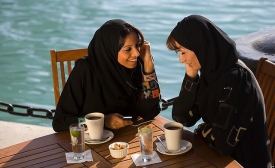Cultural Diplomacy
Lincoln Center for the Performing Arts announced the return of its Lincoln Center Global Exchange, a seminal gathering of world leaders and influencers devoted to exploring the power of art and culture to address the world's most daunting problems.[...] the second annual Global Exchange will focus on two themes: Art and Conflict and Art and the Environment.
Explore the public diplomacy potential of art to facilitate cross-cultural dialogue and understanding.
Art is the centre of human life and it plays multiple functions in any given society (religious, economic, social etcetera). This means that its role in this period of rebranding is significant. Therefore, in all the sectors of the nation which are to receive serious attention from the rebranding project, culture is one of them.
In an extraordinary act of culture and courage, a Russian orchestra performed in the ancient Syrian city of Palmyra recently liberated from the Islamic State, but Western media mocked the event, notes Gilbert Doctorow.[...] The orchestrated performed a concert of Bach, Shchedrin and Prokofiev in the Roman Amphitheater to celebrate the return of culture to a UNESCO site desecrated by its Islamic State occupiers.
A week-long visit by Sudanese Public Diplomacy Team to Ethiopia would cement the cultural, historical, people-to-people, political as well as economic relations between the two countries, House of People's Representatives Speaker and Ethiopian Public Diplomacy Team Head Abadula Gemeda said.
Ibrahima Syla arrives early to open the doors of the Fama Boutique, his shop at the Soumbédioune Craft Village in Dakar's Medina neighborhood. […] He has noticed a rise in Chinese vendors selling imitation products in markets across the city over the past two decades. "I feel concerned about it [affecting my business]," he says. "An original product is something like a dream and you don't want someone to take it."

The UAE recently appointed a Minister of Happiness--so what does that mean?







